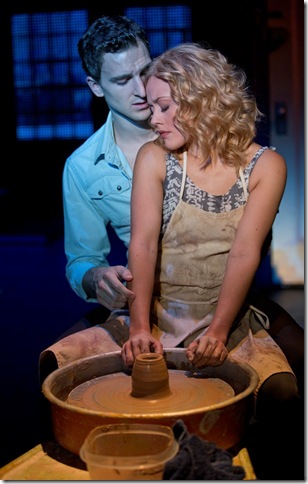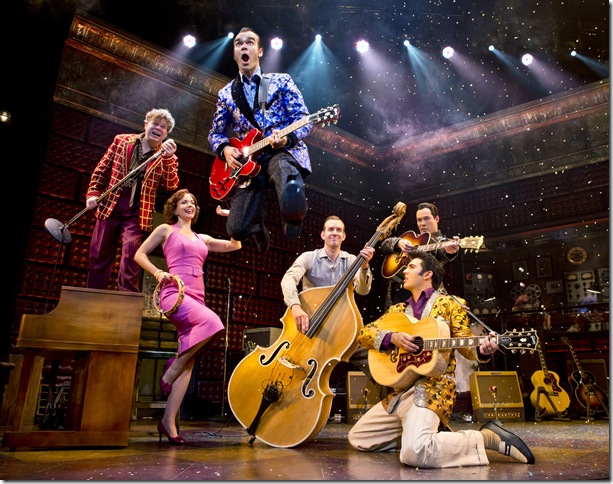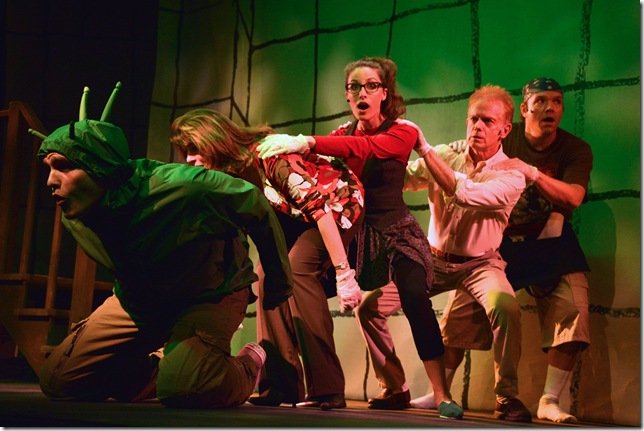You want proof that Broadway tours across the nation are starving for product? Head to the Broward Center during the next week and get a look at Ghost, the Musical, as muddled and lifeless as any show that someone thought warranted a national showcase.
In 2012, this movie-to-stage transfer eked out almost a five-month run in New York after garnering a dismissive set of reviews. But Ghost was a huge hit on screen 22 years earlier, with enough title recognition to draw an audience on the road, even if the show should have been left for dead instead.
This show about the afterlife, with so much ectoplasm floating about, is rendered so leadenly on stage, even with the involvement of one of the key creative team members from the movie. That would be Bruce Joel Rubin, who won an Oscar for his screenplay and here tries his hand at the show’s book and some of the lyrics.
The book follows the film’s plot pretty closely, though it is coarsened with cheap jokes and overwhelmed by the state-of-the-art electronic visuals and some way-cool, “how-did-they-do-that” illusions.
Rubin shares the songwriting credit with Dave Stewart (of the Eurythmics) and six-time Grammy winner Glen Ballard. Fortunately the story is familiar, because most of the overly loud lyrics are unintelligible and those quieter numbers are sing-song simplistic. In any event, the new songs are upstaged by “Unchained Melody,” a holdover from the movie, as is the perfunctory pottery scene, a clunky bit of otherworldly sensuality.
The reason to bother seeing Ghost, the Musical is its use of awesome technology, even if it does take the theater down that slippery slope of trying to compete with the movies. Most of the settings are conveyed by highly sophisticated LED screen projections, which move cinematically through the streets of New York, into the financial district and, perhaps most impressively, down to the clatter of the subway system.
The visuals are a wonder, though they tend to dwarf the performers and overwhelm the human drama. And then there are the illusions of magician Paul Kieve, who makes objects defy gravity, lets ghosts walk through doors and disappear into thin air. Such trickery does snap us out of the story, but impresses nevertheless.
The story, by the way, concerns a shiny young couple, an investment banker named Sam Wheat (Steven Grant Douglas) and his sculptor/potter girlfriend Molly Jensen (Katie Postotnik), whose happiness together is abruptly curtailed when he is killed during a botched street mugging. When his ghostly self realizes the holdup was actually premeditated murder, Sam has to find a way to warn Molly from the world beyond. That will involve a disreputable psychic, Oda Mae Brown (Carla R. Stewart), a broadly comic character who brings the evening to temporary life, even if she seems to be from a completely different show.
Trying — but not succeeding — to knit all these disparate elements into a cohesive show is director Matthew Warchus, who was more inventive with the small fry musical, Matilda. While it is hard to imagine anyone harnessing this material into a something worth caring about, certainly that is one trick that Warchus does not pull off.
GHOST, THE MUSICAL, at Broward Center for the Performing Arts, 201 S.W. Fifth Ave., Fort Lauderdale. Through May 11. Tickets: $34.50-$74.50. Call (954) 462-0222.
* * *
As significant dates in rock ’n’ roll history go, Dec. 4, 1956 looms large. That evening, in the humble studio of Sun Records in Memphis, Tenn., four young emerging icons of the music industry — Elvis Presley, Johnny Cash, Jerry Lee Lewis and Carl Perkins — found themselves together for the only time in their lives, and they launched an impromptu jam session which has since become legendary.
Understandably, Floyd Mutrux (best known for directing the 1978 film American Hot Wax) saw the potential in that jam session being recreated onstage. The result is Million Dollar Quartet, currently on at the Kravis Center after a longer-than-expected 14-month run on Broadway.
The national tour boasts four talented singer-musicians who persuasively fill those sizable shoes — blue suede and otherwise — but Mutrux’s script (co-written with Colin Escott) comes up short next to the song hit covers. The show fudges with the facts to generate its drama, but chances are most theatergoers will not mind, since they have come for the music.
During the evening, fans of that ’50s rockabilly sound largely plundered from the African-American community, will get their money’s worth listening to such vintage classics as “Hound Dog,” “I Walk the Line,” “See You Later Alligator” and “Whole Lotta Shakin’ Goin’ On.” In all, there are nearly two dozen period song classics.
In between we learn that Sun’s owner Sam Phillips had to sell Presley’s contract to RCA to keep his money-strapped company solvent. Cash and Perkins intend to switch to Columbia Records and have to break the news to their mentor. And then there’s brash, flashy newcomer Lewis, eager to attain some of the celebrity of the guys in that studio. As interesting as all this is, you will probably find yourself wishing they would just shut up and sing.
After all, the four skilled performers do resemble their famous characters enough, both visually and aurally, and all of them — James Barry (Perkins), Scott Moreau (Cash), John Countryman (Lewis) and Cody Ray Slaughter (Presley) — sing quite well and are expert on their musical instruments. In particular, Moreau’s deep bass captures Cash cannily and Countryman is aptly maniacal as he pounds away on piano.
Vince Nappo handles the narration as Phillips and Kelly Lamont appears as Presley’s girlfriend, belting out a couple of welcome, if unmotivated, song solos. All of this is directed efficiently by Eric Schaeffer, though he might have given more attention to developing the script.
Do not bolt from the Kravis at the first sign that Million Dollar Quartet is nearing its conclusion. You would miss the Mamma Mia!-style coda, when sequined jackets descend from on high and the foursome launches into one last encore each, with pumped-up energy and volume. It is the best part of the evening.
MILLION DOLLAR QUARTET, Kravis Center, 701 Okeechobee Blvd., West Palm Beach. Through Sunday. Tickets: $25 and up. Call: (561) 832-7469.
* * *
Even if you paid little attention in German lit class and wouldn’t know a Franz Kafka short story from a kaffeklatsch, there is plenty to enjoy in Will Aronson and Daniel Maté’s puckish new musical, The Trouble With Doug, inspired — but very loosely — by Kafka’s Metamorphosis.
Lyricist Maté kicked off the season at the Arts Garage with his nimble song cycle The Longing and the Short of It and this full-length book musical is further evidence of his clever wordplay. Actually Doug predates The Longing, having its roots in a school assignment at NYU, when Maté first collaborated with Aronson. The show has been in perpetual workshop mode since then — it was slated for a premiere in the Florida Stage season that never happened — and work has continued on the show, including some major new sections of the score added for this Delray Beach run.
Kafka, of course, wrote his tale as a dark, nihilist satire about a guy who finds he has been transformed into a cockroach. The Trouble With Doug is a more comic, contemporary piece about a 27-year-old computer wonk with a sunny future. He has just landed a new job in San Francisco, he has an attractive, supportive fiancée and his parents think he is terrific (well, compared to his couch potato older brother Vince, who veges out in their basement).
And then Doug’s life turns upside down when he begins morphing into a garden slug. It happens before our eyes, thanks to the physical dexterity of Clay Cartland, who throws himself about the Arts Garage stage like a slug possessed. As attention-getting as that is, Maté and Aronson really want us to focus on the toll the transformation takes on those around Doug.
Fiancée Vanessa (Alix Paige) goes to great lengths to communicate with her guy, including some human-to-gastropod sex. His parents, Lynn (Patti Gardner) and Jim (Barry Tarallo), are sweet but clueless. And while brother Vince (Shane Tanner) is something of a slug himself, his personal empathy with Doug leads to a potential solution.
Under the sly, albeit slimy, direction of Margaret Ledford, the cast commits to these cartoonish characters, particularly Cartland, who speaks in slow-motion gibberish, yearning to communicate to those around him. The show is bracing fun for a while, but eventually we are struck by a gnawing concern: What are the authors trying to convey, what is this odd occurrence a metaphor for? An abrupt life change? A debilitating disease? The transition to adulthood that leaves one unrecognizable to those around you?
Maté and Aronson prefer to keep their intentions coyly ambiguous, which is hardly the path to universality. It creates a gaping hole at the center of their story, but try not to let that get in the way of your enjoyment of the score and the performances. These are two promising musical theater voices, a commodity which we remain much in need, even if The Trouble With Doug feels like it is still on its journey towards completion, moving at a slug’s pace.
THE TROUBLE WITH DOUG, The Theatre at Arts Garage, 180 N.E. First St., Delray Beach. Through Sunday, May 11. Tickets: $30-$45. Call: (561) 450-6357.


